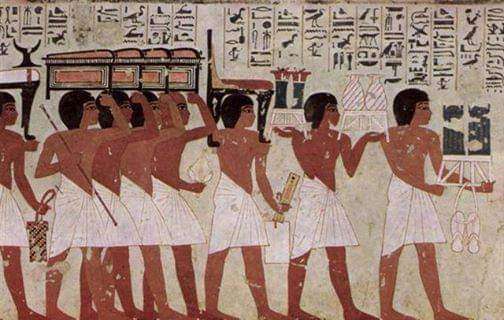More than a century ago, the ancient Egyptian artist had a prominent role in carrying out wonderful artworks which witness the brilliance of the ancient Egyptians in constructing the greatest civilization in the world.
Undoubtedly, agriculture was extremely important and an arduous work which drew the main features of the Egyptian civilization.
Without the Egyptian workers, the pyramids would not have been created, nor would the temples and cemeteries have remained until now. Moreover, we would have not learned about the wood and metal industries, as well as how to make pots, pottery, and gold.
o Most Important Industries in Ancient Egypt
Stone industries: such as making statues and stone utensils, in addition to making stone pieces from quarries.
Metal industries: such as gold, silver, as well as many artistic works such as the mask of King Tutankhamun.
Chemical industries: medicinal drugs.
Wood industries: such as the manufactured housing and funerary furniture.
o First Strike in History
The workers suffered the most from working under difficult conditions. Thus, they demanded their material rights by holding the first strike in history in the era of King Ramses III.
On the walls of the Habu Temple in Luxor, history recorded the first labor protest that dates back thousands of years.
The Egyptian workers gathered in the funerary temple built by Ramses III and declared a protest and sit-in against the king’s economic policy, based on excessively building extravagant temples, that weakened the economy at that time and delayed wages for workers in Deir el-Medina for two months.
On his part, King Ramses III complied with their demands and ended the sit-in, which is immortalized on the Habu Temple walls in Luxor.
Contributed by Omnia Ahmed













